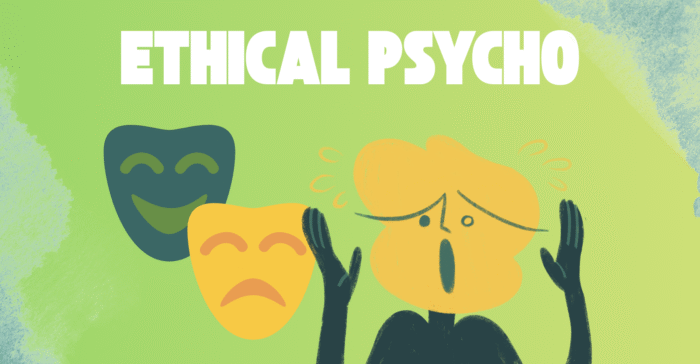What if I told you that some of the world’s most admired and decisive leaders exhibit what psychologists refer to as primary psychopathy, and not the psychopathic madness portrayed in cinematic productions such as American Psycho, but a colder, more contained calculus of charm and control? In clinical terms, as one study describes, these are “those with primary psychopathic traits, who are callous, but charming and foster relationships for manipulation and conning purposes.” (Del Gaizo and Falkenbach, 2008). They aren’t driven by chaos or impulse, but by a morbid composure, a kind of moral frost that allows them to act unflinchingly where others might hesitate.
Unlike secondary psychopaths, whose behaviour stems from impulsivity or overt antagonism, primary psychopaths are not necessarily out to harm. They operate in a strange ethical grey zone, bounded by one overriding logic: efficiency. In this sense, they are machines with a singular purpose: to achieve objectives, optimise outcomes, and maintain control, all while preserving an outward appearance of charm and rational composure.
It is this peculiar alignment of moral ambiguity and cold competence that gives rise to what we term in this article, the “Ethical Psycho.” Such leaders are not villains in the cinematic sense, nor are they blind to ethics; they measure it against the yardstick of expedience, treating human complexity as a variable to manage rather than a compass to guide.
Some researchers estimate that 12% of senior executives display psychopathic traits, making such traits several times more common in executive or top leadership roles than among the general population (University of San Diego). Others have argued that the oft-cited “One in five corporate CEOs is a psychopath” statistic is exaggerated or misinterpreted (and indeed, media sensationalism has amplified it) (Bunea, Psychology Today). But the more sober consensus is that leadership roles attract or amplify certain dark traits (fearlessness, emotional detachment, strategic ruthlessness) that sit on the psychopathy continuum (“Psychopathy in the Workplace”, Wikipedia).
The Charm of Cold Hands
Before diving in, it’s worth clarifying: this isn’t an indictment of ambition or visionary drive, but rather, a reflection on how easily power can distort the meaning of leadership. With countless impressionable youth inspired by Jobs’ visionary style…He is often held up as a revolutionary visionary, the archetype of the genius disruptor. But his leadership style was marked by mercurial tempers, ruthless demands, and famously brutal candour. Many biographers narrate how employees were pushed to breaking points, dismissed harshly, or publicly humiliated, all in the name of innovation and “excellence.” Jobs is often referenced as the “quintessential example of a narcissistic leader”. (”Double-Edged Sword of Narcissism and Leadership”). With a commander-type ENTJ personality, Steve Jobs often believed in dominance and ruthless devotion (“ENTJ Personality”, 16Personalities). Jobs’ charisma was the velvet glove; the iron fist, hidden just beneath. With countless impressionable youth, inspired by Jobs’ visionary style, mimicking his approach, mistaking ruthlessness for the gold standard of leadership, this article offers a myth-busting of sorts, aiming to offer clarity on morality and the empathetic prerequisite to effective leadership.
And so the paradox emerges: while this may sound shocking, many current leaders and emerging leaders practice it, believing empathy gets in the way of effective leadership, that having a heart means slowing down, and in an increasingly competitive atmosphere, this simply isn’t practical. Sure, leadership is pressured, and decisions sometimes demand cruelty, yet leading like that may boost short-term efficiency while simultaneously draining the ethical foundations of a team, drowning members in a sea of moral greys, much like the flawed heroes we glorify on screen, from The Mentalist (2008) to Upload (2020), who win results but at moral cost. Because here’s the inescapable reality: while it is easier to fiddle as Rome burns (a nod to Nero’s infamies), that doesn’t deny the fact that Rome is burning. So, would you watch Rome go up in flames? Hopefully not, because hopefully you understand what our experts understand.
This topic is exemplified by the rise of integrating AI systems in governance and policy-making. Check out our previous article that discusses this here.
The Fetishisation of Ruthless Leadership
There was a time when leadership meant stewardship, guiding others through peril with steadiness and foresight. Yet somewhere between the industrial revolution and the age of Silicon Valley, we began to conflate harshness with strength and human detachment with vision, often forgetting that what we call “drive” can also disguise greed, cost-cutting, and the quiet exploitation that fuels our modern comforts.
The modern workplace mythologises the hard-edged executive: the CEO who fires half a division before breakfast, the founder who sleeps under their desk (often viewed as an honour in certain parts of the world), and the manager who calls compassion “a distraction.” Typically presented in K-dramas where the wealthy CEO character nurtures his company like his first love, until he meets a romantic interest. It’s a performance of power, and one that our cultural machinery has rewarded for decades. In this theatre, the ruthless appear efficient; empathy appears expendable.
This fetishisation finds its roots in what psychologists call the “dominance prestige” paradox. The concept of dual strategies in human social status (“dominance” vs “prestige”) is established in evolutionary psychology: dominance involves coercion and fear, prestige involves competence and attraction (Kranefeld et al. 111825). A leadership article explicates that dominance-based leaders often appear efficient in the short term but undermine trust and long-term commitment. (“The Elements of Persuasion: Dominance Prestige”).
Humans are evolutionarily drawn to figures who either care for the group (prestige) or command it through fear (dominance). However, in volatile, high-pressure environments, ranging from corporate boardrooms to tech startups, dominance often overshadows prestige. The iron-fisted leader projects safety, decisiveness, and control. In times of uncertainty, coldness feels like competence.
Cultural narratives have only deepened the allure. From Gordon Gekko’s “Greed is good” (“Gordon Gekko”) to the mythos of Jobs and Zuckerberg, ruthlessness has been recast as virtue, as if kindness were a tax on greatness. The psychological seduction lies in its simplicity: cruelty clarifies, empathy complicates. Efficiency worships the former; ethics demand the latter. In corporate mythology, cruelty is a badge of honour, because nothing says “I’m competent” like a scowl and a three-page spreadsheet.
Empathetic Gains
If ruthlessness promises efficiency, empathy delivers endurance. The data, inconveniently for the cold realists, are almost unanimous: leaders who cultivate empathy outperform those who weaponise fear. A global study by the Centre for Creative Leadership found that “empathetic managers are viewed as better performers by their own bosses” across both Western and Asian corporate cultures (Gentry, Weber, and Sadri). McKinsey’s 2024 podcast on empathy and performance reached a similar conclusion: organisations led by empathetic executives “reported less burnout, reported better mental health and morale and a greater intent to stay at their organizations. People who feel empathized with also tend to innovate more and take creative risks”.(Hancock et al.). The supposed trade-off between compassion and competence, it seems, is a myth sustained by ego, not evidence. And if the workplace trends are any indication, Gen Z isn’t buying it, drawing a hard line where previous generations once romanticised burnout.
Empathy is not mere sentimentality. It is a form of perceptive intelligence, an ability to read emotional systems as deftly as one might read financial statements. It grants leaders access to information that spreadsheets cannot capture: the pulse of morale and the velocity of trust. Where psychopathic detachment optimises for immediacy, empathetic leadership optimises for sustainability.
Even within high-stakes environments, hospitals, aerospace design, and elite military units, empathy correlates not with hesitation but with precision. It reduces cognitive bias, improves collaboration, and sharpens ethical reasoning under pressure (Johnson). In other words, empathy is not the opposite of efficiency; it is its evolutionary refinement. Empathy: the ROI of the human heart, now with compounded interest.
The most formidable leaders of the coming century will not be those who numb themselves to the human condition, but those who can translate it, turning compassion into coordination and understanding into performance. For all the fetishisation of the iron fist, it is the open hand that builds institutions that last.
Because in the long run, markets reward integrity. Teams mirror their leaders. And nothing, not innovation, not discipline, not fear, compounds trust like empathy.
History Honours the Humane
Perhaps the real danger of the “ethical psycho” is not their existence, but our quiet admiration. We mistake composure for competence and moral numbness for strategic depth. Leadership was never meant to be insulation; it is translation, turning private conscience into public consequence.
Empathy is not the opposite of authority but its refinement. It transforms power from a weapon into an instrument, precise, enduring, calibrated. The leader who feels deeply does not falter; they see what others miss: efficiency built on fear is brittle, efficiency built on trust endures.
History remembers the iron fist, but it honours the humane. Rome may burn faster under ruthless command, yet it’s rebuilt by those who still feel the heat. We see this today, too, in boycotts, brand backlashes, and a growing unwillingness to reward unethical power.
The leaders who endure are not those who harden, but those who stay human. Of course, some figures, like Jobs, endure despite their ruthlessness. But even they’re remembered as cautionary icons as much as visionaries: proof that brilliance can inspire without cruelty, but not the other way around.
To be human is to feel, and the boldest act of leadership is not resisting empathy, but harnessing it to inspire, guide, and grow.
Works Cited
Bunea, Emilia, Ph.D. “The Truth About Corporate Psychopaths.” Psychology Today, 3 May 2023, www.psychologytoday.com/us/blog/to-manage-is-human/202305/the-truth-about-corporate-psychopaths.
Del Gaizo, Ariel L., and Diana M. Falkenbach. “Primary and Secondary Psychopathic‑Traits and Their Relationship to Perception and Experience of Emotion.” Personality and Individual Differences, vol. 45, no. 3, 2008, pp. 206‑12. ScienceDirect, doi:10.1016/j.paid.2008.03.019.
Gentry, W. A., Todd J. Weber, and Golnaz Sadri. Empathy in the Workplace: A Tool for Effective Leadership. Center for Creative Leadership, Feb. 2016, cclinnovation.org/wp-content/uploads/2020/03/empathyintheworkplace.pdf.
Hancock, Bryan, Jamil Zaki, Brooke Weddle, and Lucia Rahilly. “It’s Cool to Be Kind: The Value of Empathy at Work.” McKinsey & Company, 28 Feb. 2024, www.mckinsey.com/capabilities/people-and-organizational-performance/our-insights/its-cool-to-be-kind-the-value-of-empathy-at-work.
“It’s Cool to Be Kind: The Value of Empathy at Work.” Podcast, McKinsey Talks Talent, Apple Podcasts, 28 Feb. 2024, podcasts.apple.com/us/podcast/its-cool-to-be-kind-the-value-of-empathy-at-work/id1491112396.
Johnson, S. L. “The Dominance Behavioral System and Psychopathology.” Frontiers in Human Neuroscience, vol. 6, 2012, article 131, PMC, doi:10.3389/fnhum.2012.00131.
Kranefeld, Iris. “Psychopathy in Positions of Power: The Moderating Role of Position Power in the Relation Between Psychopathic Meanness and Leadership Outcomes.” Personality and Individual Differences, vol. 196, 2023, article 111825, ScienceDirect, doi:10.1016/j.paid.2022.111825.
Levenson Self‑Report Psychopathy Scale. Wikipedia, en.wikipedia.org/wiki/Levenson_Self-Report_Psychopathy_Scale.
“Psychopathy in the Workplace.” Wikipedia, en.wikipedia.org/wiki/Psychopathy_in_the_workplace.
“The Elements of Persuasion: Dominance Prestige.” Leaderonomics, www.leaderonomics.com/articles/leadership/the-elements-of-persuasion-dominance-prestige.
“Double-Edged Sword of Narcissism and Leadership.” Global Coaching Lab, globalcoachinglab.com/double-edged-sword-of-narcissism-and-leadership/.
University of San Diego. “News Detail: …” sandiego.edu/news/detail.php?_focus=81705.
“ENTJ Personality.” 16Personalities, www.16personalities.com/entj-personality.
Wikipedia. “Gordon Gekko.” Wikipedia, en.wikipedia.org/wiki/Gordon_Gekko.



